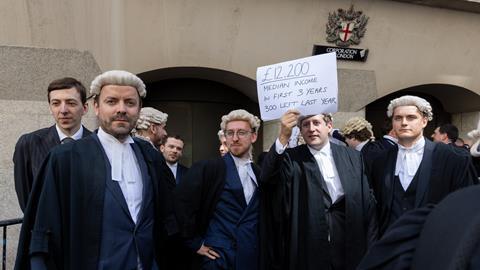Ministry of Justice data published yesterday show the criminal bar’s escalated action over legal aid funding is biting hard.
For seven weeks from 9 May, when criminal barristers were refusing to cover ‘returned’ cases, the proportion of hearings that were disrupted ranged from 1.6% to 2.5%. However, the figure jumped to 8.8% for the week commencing 27 June, when barristers across the country staged a two-day court walkout.
Court walkouts have increased by one day each week, so future statistics should show an even higher number of disrupted hearings. Next week will see court walkouts on Monday, Tuesday, Wednesday, Thursday and Friday.
The latest data was revealed in a written parliamentary response.
Justice minister Sarah Dines said: ‘It remains our priority to ensure that justice is served, and we encourage the Criminal Bar Association to work with us – the decrease in outstanding cases in the Crown court shows what is possible when we work together.’
Dines, who joined the MoJ just a few days ago, met Bar Council and CBA chiefs earlier this week.
The CBA said it had made strong representations to the minister about its ‘entirely reasonable’ demands.
‘To reiterate, these demands include an increase of 25% to AGFS [advocates graduated fee scheme] fees, the creation of a pay review body with teeth, further reforms to the AGFS that ensure payment for written work and a more flexible approach to claims for wasted and special preparation, and a second brief fee on section 28 cases.’
On the same day, the CBA also declared victory on the issue of whether the lord chancellor can add a 15% uplift to existing cases within the Crown court backlog.
Following the threat of litigation, the government conceded that awarding a 15% fee uplift to existing criminal legal aid cases poses no legal problems. Earlier this month, the then justice minister James Cartlidge told MPs there were ‘huge legal questions’ about backdating the fee increase.
However, regulations to be laid shortly introducing the fee increase will not apply to future retained work due to the ‘significant operational issues that this would entail and the financial resources it would require’, the Government Legal Department told the CBA’s lawyers.
This article is now closed for comment.




























12 Readers' comments